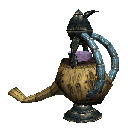
Introduction

Characters

Magic

Religion

Alchemy and
Enchantment

Monsters

Adventures:
Elsweyr (Skooma)

Tools
 Introduction |
 Characters |
|
 Religion |
 Alchemy and Enchantment |
 Monsters |
 Adventures: Elsweyr (Skooma) |
 Tools |
The world of TES:G is a "High Mana" world (GURPS Characters p.235). The Mages Guild will sell spells to anybody who can pay, and anybody can cast a spell that doesn't require some level of the Magery advantage.
Magery cannot be learned; it is innate to Dunmer, Altmer and Bretons, as well as those born under the sign of the Apprentice, the Atronach, or the Mage. Nobody else can take the Magery advantage, so for example a Bosmer born under the Steed birthsign will never be able to cast the more advanced spells. A character who starts with Magery can increase its level at character creation. I'd suggest a maximum of 2 additional levels for most campaigns, giving those who are racially talented a maximum Magery level of 3, while those whose talent derives from their birthsign will rarely exceed Magery 2. This represents natural in-born talent; it would be rare for a person to become more innately powerful during their lifetime.
When creating characters, note that you can gain Magery twice, for instance if your Breton was born under the Atronach. This confers no advantage, but neither do you pay for Magery twice; knock 5 points off the cost of the Birthsign.
Standard GURPS mages use their fatigue to power their magic, but Elder Scrolls mages use Magicka (Mana in GURPS terminology). Mages in TES:G therefore use the optional rule from GURPS Magic p.15: Fatigue Points may be bought with the limitation "Usable only for spellcasting," worth -10%
. This means that a mage can buy 10 points of Magicka for a cost of 27 CP, rather than the usual cost of 30, and there is no limit on the amount of Magicka that can be bought. This has the advantage that you're not tiring yourself out by using up fatigue, although if you run out of Magicka, you can go on to burn Fatigue and after that, Health [evil laugh]. Only mages can use Magicka, and there are no Powerstones in my version of TES:G.
TES:G magic uses the optional (and IMO mis-named) "Ritual Magic" rule (GURPS Characters p.242). The base magic skill is Thaumatology, which teaches magical theory rather than practice. Then there are six Schools of Magic: Alteration, Conjuration, Destruction, Illusion, Mysticism, and Restoration.
Every spell is a Technique falling under one of these Schools. GURPS Magic includes over 800 spells so I never created a full list, instead, I decided what school each spell was when a player character or NPC took it. Generally it's pretty obvious - you have no business GMing if you can't figure out Minor Illusion, Fireball, and Major Restoration - but sometimes you'll have to make a judgement call. Just remember to write down your decision, so you don't hand out Telepathy as Illusion to your first wizard and Mysticism to your second.
Each spell is a Hard Technique, defaulting to the appropriate School minus the number of prerequisites (p) it would have under the standard system, as described in GURPS Characters p.235. But you don't need to count them for each spell; they're in the back of GURPS Magic, or alternatively, all neatly typed up in an alphabetical list by Eliza Evans.
Under the "Ritual Magic" system, any spell can be cast without knowing the prerequisites, as long as you know the spell. A characters who wants to cast spells they didn't start the campaign will have to learn the new spells somehow; the easiest way is to find the nearest Mages Guild, although they won't necessarily have all the spells you want.
If a spell doesn't require Magery, any character can learn to cast it. In TES:G, any farmer with the inclination can learn a trivial light spell for a week's wages if they prefer that to burning torches, and solo travellers will usually learn a couple of fire spells to ward off hungry wildlife. If they don't have Magery, bear in mind they'll be powering the spell from their own Fatigue.
To learn a spell, first make sure the local Mages Guild teaches it. Then take the number of prerequisites plus one (so for a Fireball, p = 3 + 1 = 4). Learning the spell takes p hours, and costs 100 gold * the pth triangular number (so for a fireball, 100 * Tp = 100 * 6 = 600 gold). This worked fine for my campaign, but change it if you need to.
Not every Mages Guild teaches each spell, and the more complex (the greater p is) the less likely the local Guild will have somebody who knows it. Some spells just don't exist: in my campaign, there is no time travel, no resurrection, and until a group of rogue mages revoked the Levitation Act, no levitation. Also there are some spells which no Mages Guild member in good standing will teach you. (Necromancy is illegal in certain places and at certain times. In my campaign, most necromantic spells were part of the Restoration or Conjuration Schools, but you may wish to add Necromancy as a seventh School of Magic, taught only illegally).
Those born under the signs of the Lover, the Ritual, the Serpent, the Tower or the Shadow have the innate ability to cast one or two specific spells, or Powers. They don't need Magery to cast them, even if they normally would, though if they don't have Magery they'll have to use Fatigue rather than Magicka.
These powers can never be improved, and don't benefit from Magery. On the other hand, they don't need a ritual to cast - you can just do them, without knowing how or why. You do need to touch the subject (or point, for the Ritual's Turn Zombie power).